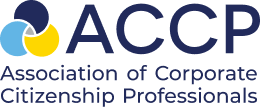Dana Frazeur, ACCP
Sr. Marketing Manager
.png)

As President of the T. Rowe Price Foundation and of T. Rowe Price Charitable, John Brothers knows well the value of community involvement. Being a former community organizer and a part of the Baltimore community – a site of great racial unrest in recent years, including the 2015 death of Freddie Gray – provides him a unique perspective on the issue of racial justice. John recently spoke to ACCP at our virtual conference event about the importance of being a good community partner.
John’s first tip is a simple one – be a good listener. As a former community organizer, John understands the power of listening to your community. “People are asking ‘what can we do?’ and that makes total sense, but I think the ‘how’ of philanthropy in these instances is as important, if not more important, than the action of philanthropy. We’ve just got to be good listeners, as a start. The issues aren’t always what you assume they are.”
The current push for racial justice reform and protests around the country harkens back to the days after the death of Freddie Gray. John landed in Baltimore in the days following the incident. But despite the ongoing unrest today, John still feels encouraged. “The lessons of 2015 and Freddie Gray still hold true today: those who are in a place of privilege or have some semblance of power in certain ways right now need to use that power and privilege and give it to others. They need to be good listeners and be willing to be led.”
At a time when companies are issuing statements about their commitment to racial justice, it’s important to remember these same companies must show the work they’re doing – John calls those “receipts”. “It’s about what your receipts are, and what structures you’re putting into place to achieve those receipts – receipts being impact on the ground. There’s a place for “statements” but if you have no receipts after you issue your statement, it doesn’t mean a lot. I believe that if we want to be serious about the issue of racial injustice, we have to begin by looking inward. Evaluate how one might be advancing structural racism, and plan how to do the long-term work of offering strategies to combat inequalities and achieve racial justice.”
John also believes in the importance of trust between corporations and the communities they serve. “We’ve engendered trust with the Baltimore community, based on the partnerships we have built. But we also know at any time we could lose that trust if we’re lazy or don’t show up for them.” John goes on to say, “The language of community is important. For the T. Rowe Price Foundation, what community members have said to us is “we feel like impact has been done to us, not with us or for us. It just looks at us as problems to be solved, not assets to be cultivated.” Treating community as a partner is important, especially in building trust.”
Amid a pandemic, the issue of trust may be more important than ever. “COVID-19 has put an exclamation point on the values the T. Rowe Price Foundation set five years ago and how important those still are,” John says. “Our corporate collaboration and our experience in 2015 helped put resources into the hands of neighbors who we now know by name.”
One example of this? While many corporate giving efforts were understandably focused on frontline workers and healthcare during the pandemic, John and his team at T. Rowe Price also made the unique decision to focus on the arts. Having a dedicated arts budget already, the company has been a long-time supporter, and knew well the considerable economic contributions of the arts in Baltimore. For more information on this partnership, you can read T. Rowe Price’s blog post. ACCP will be featuring this partnership in an upcoming webcast on July 22, “Supporting the Arts During Times of Crisis.” The webcast will include leaders from the T. Rowe Price Foundation and the Maryland Citizens for the Arts to further discuss the ways arts and culture organizations and artists are uniquely affected by the COVID-19 crisis, and how corporate philanthropy can better support creative communities now and in the future
John believes in the power of corporations to make a difference, not just financially but with skills-based efforts as well. “If anyone is thinking of corporate social good only in terms of their financial prowess, in fact there are lots of nooks and crannies in a corporation that can be used to make communities stronger. So, focusing on how the work gets done and leveraging those nooks and crannies allows us to have much more of an impact than if we thought just in terms of straight dollars. And it continues to gain us trust in order to be able to make an impact on the ground.”
“We have a long way to go in terms of racial injustice – there are still “roots and shoots”. These issues we’re trying to work on are decades – if not longer – in the making. We can’t pat ourselves on the back or give ourselves high fives. We need to stay committed to our values, keep digging in, let folks lead us and I think we’re going to continue to find the outcomes we want.”

